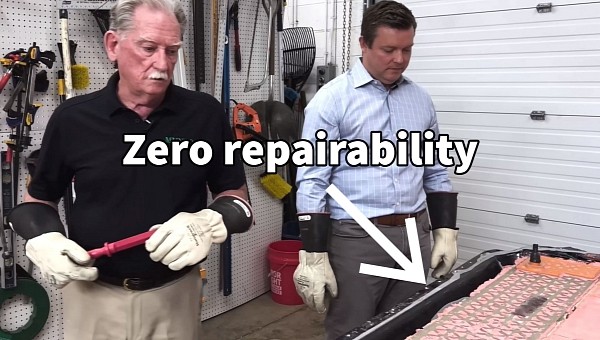Electric vehicles were supposed to be sustainable and save the planet, but they are more of a burden so far. Even minor damages to the battery pack in an accident can prompt insurers to write off cars with few miles. That’s because the replacement cost is high, and insurers cannot afford to let them back on the road and risk a lawsuit if something bad happens.
We’ve already discussed how electric vehicles with very few miles on the odometer are scrapped because the insurance companies deem the repairs too costly. This worrying trend ultimately leads to increased insurance costs for everybody. Tesla addressed this by launching its own insurance business to offer lower rates to owners, but the problem remains. Many electric vehicles are written off for minor damages, becoming an environmental liability. No matter how sustainable an EV is, it will not fulfill its destiny if you have to throw it away after a minor collision.
The problem is even more serious with the battery packs. The battery is the most expensive single component of an electric car, and when it gets damaged, the repair costs can easily surpass the car’s value. The battery also presents dangers when it is damaged. With very few possibilities to assess the nature and extent of the damages after an accident, insurance companies take no chance. This is another reason electric vehicles are sent to the scrapyard even after a minor scratch on the battery pack.
Car companies have taken different paths to building battery packs. Traditional carmakers are more likely to have battery packs that are easier to break down into modules and repair separately. This lowers the cost of repairs because only the affected module is replaced. On the other hand, Tesla has prioritized production costs and energy density with its structural battery packs. This means the battery cells are glued to each other and integrated into the car’s structure, making any repair impossible.
Teardown veteran Sandy Munro, who disassembled a Tesla Model Y with a structural battery pack, described it as having “zero repairability.” Tesla has never offered repairs for its battery packs, preferring to replace the pack when necessary, even for a broken pipe. Third-party garages, on the other hand, have been repairing classic battery packs in Tesla vehicles for years. With structural battery packs, this is no longer possible.
The problem is accelerating as more electric vehicles are bought and crashes involving EVs increase. At Synetiq, the UK’s largest salvage company, the number of damaged electric vehicles has soared from around a dozen every three days to more than 20 per day over the past 12 months. The UK has no recycling facility, so the company removes the battery packs from the written-off cars and stores them in containers.
Many of the cells inside them could be undamaged and, therefore, reusable, but nobody assumes responsibility for saying they are safe without access to the battery diagnostics data. Car insurers know this very well and price their products accordingly, leading to increased insurance rates for electric vehicles. According to Reuters, the average U.S. monthly EV insurance payment in 2023 is $206, 27% more than for a combustion-engine model.
The problem is even more serious with the battery packs. The battery is the most expensive single component of an electric car, and when it gets damaged, the repair costs can easily surpass the car’s value. The battery also presents dangers when it is damaged. With very few possibilities to assess the nature and extent of the damages after an accident, insurance companies take no chance. This is another reason electric vehicles are sent to the scrapyard even after a minor scratch on the battery pack.
Car companies have taken different paths to building battery packs. Traditional carmakers are more likely to have battery packs that are easier to break down into modules and repair separately. This lowers the cost of repairs because only the affected module is replaced. On the other hand, Tesla has prioritized production costs and energy density with its structural battery packs. This means the battery cells are glued to each other and integrated into the car’s structure, making any repair impossible.
Teardown veteran Sandy Munro, who disassembled a Tesla Model Y with a structural battery pack, described it as having “zero repairability.” Tesla has never offered repairs for its battery packs, preferring to replace the pack when necessary, even for a broken pipe. Third-party garages, on the other hand, have been repairing classic battery packs in Tesla vehicles for years. With structural battery packs, this is no longer possible.
The problem is accelerating as more electric vehicles are bought and crashes involving EVs increase. At Synetiq, the UK’s largest salvage company, the number of damaged electric vehicles has soared from around a dozen every three days to more than 20 per day over the past 12 months. The UK has no recycling facility, so the company removes the battery packs from the written-off cars and stores them in containers.
Many of the cells inside them could be undamaged and, therefore, reusable, but nobody assumes responsibility for saying they are safe without access to the battery diagnostics data. Car insurers know this very well and price their products accordingly, leading to increased insurance rates for electric vehicles. According to Reuters, the average U.S. monthly EV insurance payment in 2023 is $206, 27% more than for a combustion-engine model.






